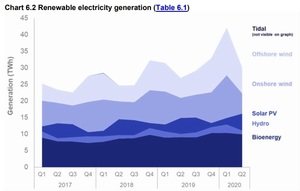The U.K. government announced on Oct. 15 that it intends to publish a new biomass strategy in 2022. The U.K. Renewable Energy Association welcomed the announcement, stressing that bioenergy is essential to the renewables revolution.

The U.K. Department for Business, Energy and Industrial Strategy committed to the development of a new bioenergy strategy in its response to the Committee on Climate Change’s 2020 progress report, which was published in June. The CCC report addresses progress in reducing U.K. emissions and assesses the government’s climate change mitigation activity.
Within its progress report, the CCC called for the U.K.’s bioenergy strategy to be refreshed in line with recommendations on governance, monitoring and best use from the CCC’s 2018 biomass report and 2020 land use report. The CCC said the refreshed strategy should include consideration of the best uses of biomass and waste resources through 2050, including wood in construction and the wider bioeconomy; the role of carbon capture and storage (CCS) and requirements for CCS-readiness, with clear dates for when CCS will need to be integrated across biomass and waste facilities; U.K. and international governance over biomass feedstocks; support schemes, including for carbon dioxide removal and sequestration; aviation biofuels and U.K. production of biomass feedstocks.
In its response, the BEIS said it intends to publish a new biomass strategy in 2022. That refreshed strategy is expected to build on the 2012 U.K. bioenergy strategy and will aim to bring together many departments whose policies for net zero involve the use of sustainable biomass. The BEIS also said it will take into account the CCC’s recommendations as it develops the refreshed strategy and will set out more details in its energy white paper. A progress update is expected to be released next year. In addition, the BEIS said it will launch a call for evidence on greenhouse gas removal (GGR) support mechanisms later this year that will explore both long- and short-term options for GGR, including for bioenergy with carbon capture and storage (BECCS).
“We note the Government’s response to the CCC’s report and strongly welcome the government’s new commitment to delivering a revised Bioenergy Strategy for the U.K., in line with the recommendation of the Committee on Climate Change and building on the REA’s own industry-led Bioenergy Strategy, published last year,” said Nina Skorupska, chief executive of the REA.
According to the REA, bioenergy is essential to the renewables revolution. The group said bioenergy’s role is diverse, contributing an immediate and affordable solution to the decarbonization of heat and transport, while providing dispatchable renewable power that enables energy security. If done sustainably, the REA estimates bioenergy could meet 16 percent of primary energy supplied by 2032 and stressed the U.K. will not meet its net-zero goal without it.







